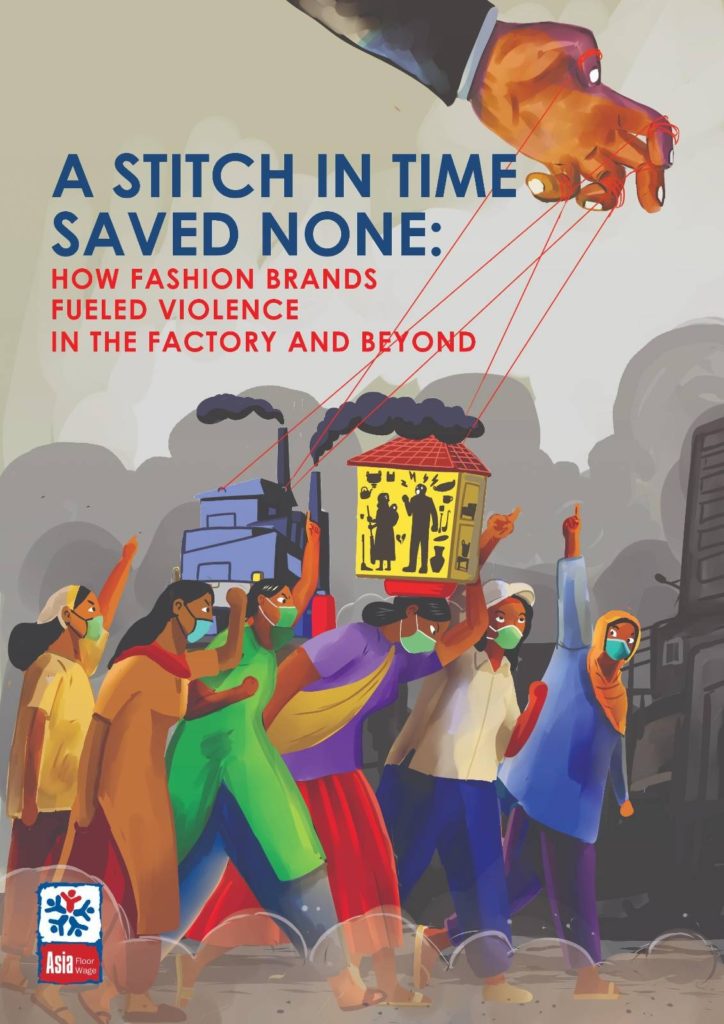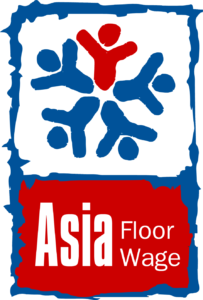AFWA Releases Report on Gender-Based Violence and Harassment in Fast Fashion Supply Chains during the COVID-19 Pandemic
9th December, 2021: A report published today by Asia Floor Wage Alliance (AFWA), titled “A Stitch in Time Saved None: How Fashion Brands Fueled Violence in the Factory and Beyond, reviews the gendered impact of Covid-19 on garment workers and calls for transformational interventions to end all forms of violence in garment global supply chains. The report elaborates “economic harm” as a form of gender-based violence (GBV) and explains how the business models of global apparel brands exacerbated women garment workers’ vulnerability to violence both inside the factories and in their homes, families, and communities.

You can read the report here.
Ashley Saxby, lead researcher and South-East Asia Coordinator of AFWA says, “At the outset of the Covid-19 pandemic, brands abandoned workers in their supply chains and women were left to fend for themselves and their families through any means, which entailed reducing their consumption, taking on huge debt, and selling meagre assets to cover the costs of basic survival. Further, economic insecurity and forced intensification of work imposed by brands reinforced gender inequality and led to increased incidences of GBV in the home and wider community.”
The report based on interviews and discussions with 400+ women garment workers, across six Asian garment-producing countries including Bangladesh, Cambodia, India, Indonesia, Pakistan and Sri Lanka, maps the spectrum of violence women garment workers faced during the pandemic, due to avoidable risk factors associated with brand purchasing practices and nature of women’s workforce participation in fashion supply chains.
Sumiyati, National Women Committee Leader of Serikat Pekerja Nasional (SPN) and member of AFWA Women Leadership Committee (WLC) says, “Women workers subsidized global apparel brands during the pandemic in 2020 not only through wage theft, but also through social reproduction of the workforce at great personal expense including their physical and mental well-being. Increased levels of job insecurity among women garment workers during the pandemic, heightened fears of retaliation and undermined reporting of GBVH, reinforcing cultures of impunity and increasing women workers’ vulnerability to all forms of violence.”
The report also provides a roadmap of steps fashion brands should take, both in the short term and in the long term, to prevent, mitigate and remediate gender-based violence in fashion supply chains. The report calls for redesigning supply chains in ways where brands are held accountable for business practices that perpetuate gender-based violence and massive inequalities in the Global South.
Yang Sophorn, President of Cambodian Alliance of Trade Unions (CATU) and member of AFWA Women Leadership Committee (WLC) says, “Brands must ensure that their conduct does not create conditions of economic violence, which violate women workers rights to safe and dignified working and living conditions. Achieving violence-free workplaces requires brands to work with trade unions and their women leadership, at the factory, national and regional levels to identify and address the specific spectrums of violence and associated risk factors, linked with brand purchasing practices.”
Zehra Khan, General Secretary of Home-Based Workers Federation, Pakistan says, “Freedom of association, social dialogue and worker-friendly complaint grievance redressal mechanisms are fundamental to ending GBV and advancing social justice in fashion supply chains. Addressing GBVH requires protecting and promoting women garment workers’ associational agency, including their ability to join trade unions to negotiate collective bargaining and legally binding enforceable brand agreements to prevent and remediate GBV.”
The report, by providing an overview of how the business practices of global fashion brands have negative impacts on the physical, reproductive and mental health of women workers in their supply chain, explains why strategic interventions to prevent and remediate GBV is an urgent business imperative. While the report names the brands in whose supply chains GBV was found – it refrains from currently publishing the names of a few specific brands, which are engaging in dialogue with good faith and are using their economic leverage to ensure suppliers address and remediate the GBVH detected. AFWA hopes that this will help build confidence in the ongoing negotiation process and will assist in reaching a quick and just resolution, which can then be replicated in other places to address the GBV across the supply chain in a sustainable manner.
Meaningful corporate accountability requires brands to uphold ILO Convention -190 (C-190) obligations to end GBVH, contribute to social protection floors and enforce the payment of living wages to the workers in their supply chains. AFWA hopes that brands uphold binding accountability for C190 by negotiating with the AFWA-Women Leadership Committee (WLC) enforceable agreements to end GBVH and other forms of violence in the world of work.
